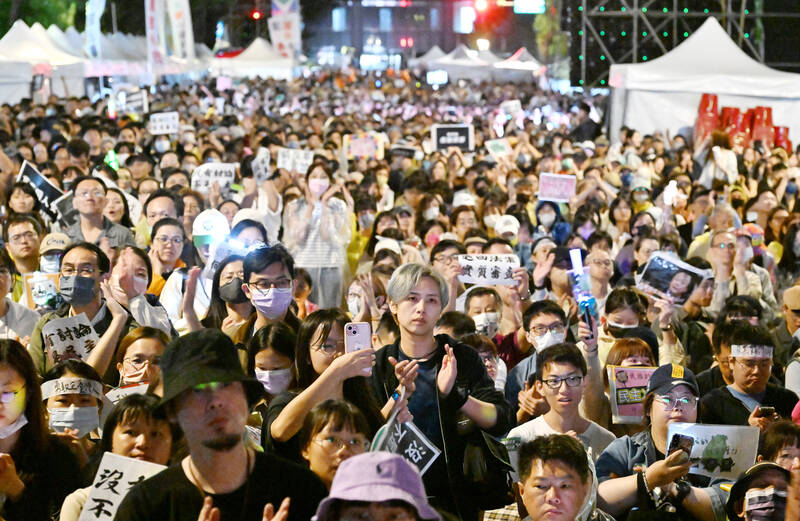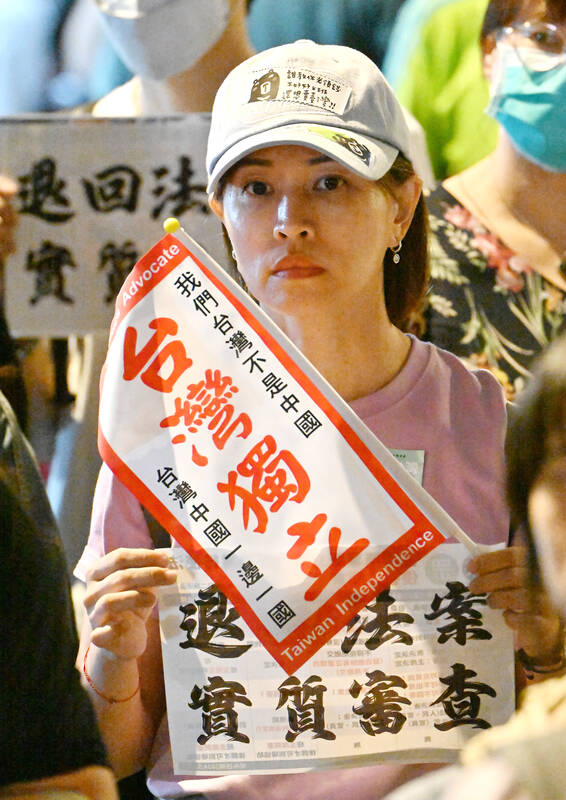The legislature’s passage last week of the “reform” bills giving it the power to summon anyone and subject them to questioning, fines and perhaps imprisonment, over the objections of numerous civil society organizations and mass protests, may precipitate a whole series of constitutional crises, dividing society at a time when it must be most united in the face of the mortal threat from Beijing.
KMT Caucus Convener Fu Kun-chi (傅?萁) announced after the passage of the bill that the legislature would form a special investigations unit and investigate the previous administration over vaccine purchases, eggs and other items. It appears the KMT is going to revive its program from the last time it was in a position to investigate the previous administration.
KMT WITCH-HUNTS

Photo: Tien Yu-hua, Taipei Times
To understand the KMT’s move, we must return to the days of the Ma Ying-jeou (馬英九) administration’s witch-hunts against officials and politicians of the Democratic Progressive Party (DPP). After Ma took power in 2008 the justice and investigative units were sent in pursuit of “corruption” in the DPP.
The investigation and indictment of former DPP president Chen Shui-bian (陳水扁) was the centerpiece of this program: he was prosecuted not because he was corrupt, but because he was Chen Shui-bian. Having usurped “their” Republic of China (ROC), his destruction was foreordained. Now forgotten are the telling moments when prosecutors held a skit depicting Chen as a drug addict with AIDS, and when eight of them banded together to swear they would convict him. But his case overshadowed the scores of other cases filed against DPP politicians by the Ma government.
Beginning in the late summer and fall of 2008, prosecutors detained and indicted former and current DPP politicians. While in a few cases charges were filed, many were held incommunicado (thus unable to fight slander and innuendo) and without charges.

Photo: Tien Yu-hua, Taipei Times
Take for example Chen Ming-wen (陳明文), the DPP county commissioner in Chiayi, generally rated among the best performing mayors of the day. Chen was accused of “seeking illegal gains” on a sewer contract. After 18 months of investigation, prosecutors were unable to show evidence of collusion on the contract or of illegal gains. Nevertheless, despite the lack of evidence, prosecutors were able to have Chen detained for four months, to give them time to find evidence. Chen was finally cleared in 2012.
The raft of arrests and detentions included former DPP interior minister Yu Cheng-hsien (余政憲), along with former DPP Yunlin County mayor Su Chih-fen (蘇治芬) and former presidential deputy secretary general Ma Yung-cheng (馬永成).
This continued unabated for most of Ma Ying-jeou’s two four-year terms. In 2009, for example, Taichung District prosecutors indicted DPP secretary-general Wu Nai-jen (吳乃仁) and former DPP legislator Hong Chi-chang (洪奇昌). These cases dragged on for years in appeals.
Most cases fell apart, but the damage to the victims and their families was incalculable. When the special investigations unit inevitably failed to obtain convictions, in 2011 president Ma announced the formation of a new Agency Against Corruption to continue the program. The attacks continued, coincidentally peaking when elections were about to be held. In July of 2014, for example, the special investigations division (SID) summonsed all the DPP secretaries-general, including Joseph Wu (吳釗燮), the current head of the National Security Council (NSC), who had served in that position during 2002 and 2004.
Some people faced years in limbo. In 2008 Sino Swearingen Aircraft Corp (SSAC) chairman and chief executive Kuo Ching-chiang (郭清江) was investigated, after allegations of involvement in embezzlement and corruption at SSAC. Usually investigations were finalized within eight months, but the case went on for five years, the investigation unresolved.
Most readers are old enough to remember the famous battle between Ma Ying-jeou and KMT heavyweight legislator Wang Jin-pyng (王金平) that paved the way for the Sunflower occupation of the legislature. That fight revealed that the SID was wiretapping the legislature. This turned into a comic-opera disaster for the Ma administration, with the justice minister coming under investigation by the SID (eventually resigning) and the filing of 86 motions against prosecutor-general Huang Shih-ming (黃世銘) requiring investigation by 18 prosecutors. The prosecutions ground to a halt.
HERE WE GO AGAIN
This time around, the KMT’s likely goals are once again to smear and detain DPP politicians and officials, consuming their energy and resources. Later, I expect the KMT to broaden its targets to include civil society leaders and local journalists — “Hongkongizing” Taiwan. This will tie up the legislature with pointless, time-consuming investigations (even if judicial review strikes down the “reforms,” the resources are still wasted). The KMT needs a spectacle to hide its utter lack of a positive program to address urgent national problems like birth rates, wages and housing prices. These will be back-burnered, along with urgently needed defense spending. The public can be expected to blame President William Lai (賴清德).
If the Ma Administration playbook is used, next year the special investigations will re-orient from attacking Tsai to currently serving DPP politicians, coincidentally just before the local elections. They will summon government officials in search of information on everything from relations with other governments to weapons and defense programs. Other evils such as document forgery will no doubt be deployed — recall the accusations against DPP candidate Tsai Ing-wen (蔡英文) in the 2012 election about her TaiMed investment that involved apparent forgeries. Now clouds of government documents could be accessed (looking forward to the AI chat fakes).
This playbook will be followed as long as the KMT can control the legislature, or until it turns on itself like it did last time. It is highly likely it will turn on its allied party, the Taiwan People’s Party (TPP), at some point. To his credit, late last week TPP Chairman Ko Wen-je (柯文哲), listed as a suspect in a corruption investigation early last month, seemed to be distancing his party from an investigations program.
The false claims that these “reforms” are the same as those in proposed (but never introduced) DPP bills are distractions — mere “gotcha” games. The real evil of these new legislative powers stems from the alliance of the KMT and TPP with the Chinese Communist Party (CCP). Numerous KMT officials and legislators have visited the PRC in recent years. Recall that Fu was in the People’s Republic of China (PRC) in April, one of a group of 17 KMT legislators, and that as soon as he returned, he introduced legislation to weaken the anti-infiltration laws and bring Taiwan’s labor laws into alignment with the PRC’s.
In 2001 Taiwanese historian Lee Hsiao-Feng (李筱峰) observed in an article in the Independence Evening Post (自立晚報) in 2001 that if one day Beijing wants to take Taiwan, the first place they attack will be the Legislative Yuan.
It appears the assault is now underway.
Notes from Central Taiwan is a column written by long-term resident Michael Turton, who provides incisive commentary informed by three decades of living in and writing about his adoptive country. The views expressed here are his own.

In the March 9 edition of the Taipei Times a piece by Ninon Godefroy ran with the headine “The quiet, gentle rhythm of Taiwan.” It started with the line “Taiwan is a small, humble place. There is no Eiffel Tower, no pyramids — no singular attraction that draws the world’s attention.” I laughed out loud at that. This was out of no disrespect for the author or the piece, which made some interesting analogies and good points about how both Din Tai Fung’s and Taiwan Semiconductor Manufacturing Co’s (TSMC, 台積電) meticulous attention to detail and quality are not quite up to

April 21 to April 27 Hsieh Er’s (謝娥) political fortunes were rising fast after she got out of jail and joined the Chinese Nationalist Party (KMT) in December 1945. Not only did she hold key positions in various committees, she was elected the only woman on the Taipei City Council and headed to Nanjing in 1946 as the sole Taiwanese female representative to the National Constituent Assembly. With the support of first lady Soong May-ling (宋美齡), she started the Taipei Women’s Association and Taiwan Provincial Women’s Association, where she

Chinese Nationalist Party (KMT) Chairman Eric Chu (朱立倫) hatched a bold plan to charge forward and seize the initiative when he held a protest in front of the Taipei City Prosecutors’ Office. Though risky, because illegal, its success would help tackle at least six problems facing both himself and the KMT. What he did not see coming was Taipei Mayor Chiang Wan-an (將萬安) tripping him up out of the gate. In spite of Chu being the most consequential and successful KMT chairman since the early 2010s — arguably saving the party from financial ruin and restoring its electoral viability —

It is one of the more remarkable facts of Taiwan history that it was never occupied or claimed by any of the numerous kingdoms of southern China — Han or otherwise — that lay just across the water from it. None of their brilliant ministers ever discovered that Taiwan was a “core interest” of the state whose annexation was “inevitable.” As Paul Kua notes in an excellent monograph laying out how the Portuguese gave Taiwan the name “Formosa,” the first Europeans to express an interest in occupying Taiwan were the Spanish. Tonio Andrade in his seminal work, How Taiwan Became Chinese,